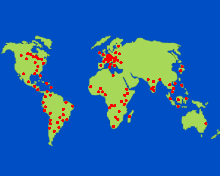Ursulines

The Ursulines , actually Society of St. Ursula in Latin Ordo Sanctae Ursulae , abbreviation OSU , formerly also called Ursuline Sisters, are a religious community founded by Angela Merici in 1535 in Brescia , which works in the upbringing and education of girls. The beginnings of the work of the Ursulines are considered to be the "beginning of the entire modern upbringing of girls". The Ursulines are under the patronage of St. Ursula .
history
Origins
In the original form of the Compagnia di Sant'Orsola ("Society of St. Ursula"), women lived according to the evangelical counsels of poverty , celibacy and obedience , but without being bound by solemn profession and thus by the cloister of a monastery. They continued to live with their families, met regularly for worship, prayer, and spiritual training, and continued to wear ordinary clothing. The aim of the community was to strengthen one another in religious life and to encourage others to live according to the gospel through their conduct . This was not associated with a specific task. The “Compagnia di Sant'Orsola” was in some ways the first secular institute . Angela Merici wrote a rule for this community.
After Angela's death, the members of the community were increasingly entrusted with catechism lessons, which were offered everywhere in the wake of the Council of Trent . Cardinal Karl Borromeo , the Archbishop of Milan, entrusted them with the care of orphan girls; the Ursulines recognized the need for a community life.
distribution
The Ursulines spread very quickly in France via Avignon . Increasingly, they also gave lessons in the elementary subjects of reading, writing, arithmetic and handicraft. At the beginning of the 17th century the community transformed into a closed order; this happened both at the request of the sisters themselves and through external pressure. Although they were now subject to the strict rules of the cloister , bringing up girls remained the task of the sisters.
In 1639 the first Ursulines came to Cologne and founded the first Ursuline monastery there on German soil. Today there are Ursulines in almost all parts of the world. They live both in monasteries and in apartments. In total there are more than 10,000 sisters in the order.
Associations and Congregations
- The Roman Union of the Order of St. Ursula or Ursulines of the Roman Union, who on November 25, 1900 at the request of Pope Leo XIII. was founded, there are 27 provinces in 34 countries, in the province of Austria for example 3 (Salzburg, Klagenfurt, Vienna).
- The Federation of German-speaking Ursulines (Ursulines of the German Federation) brings together 34 conventions, branches and small communities in Germany, two in Austria (Graz, Innsbruck) and a few houses in Northern Italy and South America.
- There is also the Congregation of Calvarienberg-Ahrweiler in Germany with four branches.
Other Ursulines are:
- Ursuline Sisters of the Sacred Heart of Jesus in agony (USKJ)
- Society of St. Ursula founded by Anne de Xainctonge , 1606
In addition to traditional educational activities, many other apostolates have now taken place.
Secular Institute of Saint Angela Merici
The international secular institute of St. Angela Merici is an institute of consecrated life , it was recognized as a secular institute under papal law on May 25, 1958 and follows the form of the order from the founding years around 1535. Today the secular lecturers are active worldwide, most of them have worked in the major Ursula family united. In Germany, the sisters each have a branch in Erfurt, Augsburg , Flensburg and Würzburg . The statutes are based on the principles of St. Angela, the women dedicate their lives to following Jesus Christ and promise a life according to the evangelical counsels. The first time after admission consists of two years of spiritual training and concludes with temporary profession . This is taken after two years for a further three years. After five years, with perpetual profession, the final admission into the secular institute takes place.
Well-known Ursulines
- Marie de l'Incarnation (Marie Guyart) (1599–1672), went to Canada in 1639 as a missionary
- Isabella Leonarda (1620–1704), composer in Novara , Italy
- the Ursuline martyrs († October 17-23 , 1794) were executed on the scaffold in Valenciennes during the French Revolution
- Ursula Ledochowska (1865–1939), founded the Ursuline Sisters of the Sacred Heart of Jesus in agony
- Blandine Merten (1883–1918), teacher, was beatified in 1987
- Tisa von der Schulenburg , sister Paula (1903-2001), sculptor and draftsman
- Johanna Eichmann (1926–2019), teacher and superior of the Ursulines in Dorsten, founder of the Jewish Museum Westphalia
- Dianna Ortiz (* 1961), anti-torture activist
- Cristina Scuccia (* 1988), educator and pop singer
St. Ursula Schools
See also
Web links
- ↑ Ursulines of the Roman Union / Ursulines de l'Union Romaine , ursulines-ur.org
- ↑ Ursulines of the Roman Union in Austria , ursulanet.at
- ↑ Ursulines of the German-speaking Federation , ursulinen.de
- ↑ Ursulinenkongregation Calvarienberg Ahrweiler , ursulinen-calvarienberg.de
- Directory of the Ursulines in German-speaking countries on medals online
Individual evidence
- ^ Ferdinand Seibt : Karl V. The Emperor and the Reformation . Siedler, Berlin 1990, ISBN 3-88680-338-4 , p. 153.
-
↑ Ursulines of the Roman Union (Austria) ( Memento from February 19, 2016 in the Internet Archive ) , provinzialat.at;
Ursulines of the Roman Union in Vienna - Austrian Province , Department for the cultural assets of the orders, kulturgueter.kath-orden.at - ^ Company of St Ursula, Lancaster Archived copy ( October 20, 2012 memento in the Internet Archive )
- ↑ Secular Institutes Germany Archived copy ( Memento from September 24, 2015 in the Internet Archive )
